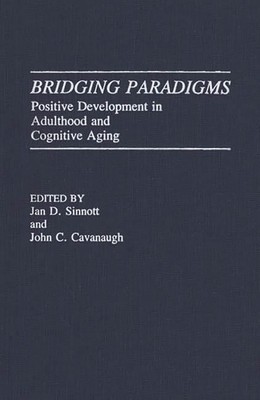
- We will send in 10–14 business days.
- Author: John C Cavanaugh
- Publisher: Praeger
- ISBN-10: 0275936171
- ISBN-13: 9780275936174
- Format: 15.6 x 23.4 x 1.8 cm, hardcover
- Language: English
- SAVE -10% with code: EXTRA
Reviews
Description
This volume examines positive development across adulthood with particular emphasis on postformal thought. The editors acknowledge that researchers have compiled a substantial body of descriptive evidence about the styles of thinking used by adults under certain conditions. The questions that remain are whether these styles reflect qualitative changes; how these styles develop; whether there are necessary precursors; why there is content specificity; what the relationship is to physiological or neurological development; whether adults can deliberately control postformal thought; how postformal thought develops in different cultures; what key developmental experiences, if any, are needed for postformal thought to develop; and what postformal thought means in a practical sense.
These questions are addressed by the research and theory discussed in this volume. The contributors reflect a diversity of backgrounds assumptions, disciplines, and methods. Postformal thought and its correlates are described from physiological, psychological, sociological, anthropological, and clinical perspectives.
EXTRA 10 % discount with code: EXTRA
The promotion ends in 20d.21:35:45
The discount code is valid when purchasing from 10 €. Discounts do not stack.
- Author: John C Cavanaugh
- Publisher: Praeger
- ISBN-10: 0275936171
- ISBN-13: 9780275936174
- Format: 15.6 x 23.4 x 1.8 cm, hardcover
- Language: English English
This volume examines positive development across adulthood with particular emphasis on postformal thought. The editors acknowledge that researchers have compiled a substantial body of descriptive evidence about the styles of thinking used by adults under certain conditions. The questions that remain are whether these styles reflect qualitative changes; how these styles develop; whether there are necessary precursors; why there is content specificity; what the relationship is to physiological or neurological development; whether adults can deliberately control postformal thought; how postformal thought develops in different cultures; what key developmental experiences, if any, are needed for postformal thought to develop; and what postformal thought means in a practical sense.
These questions are addressed by the research and theory discussed in this volume. The contributors reflect a diversity of backgrounds assumptions, disciplines, and methods. Postformal thought and its correlates are described from physiological, psychological, sociological, anthropological, and clinical perspectives.


Reviews